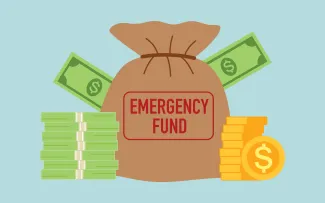
Financial Fundamentals — Emergency Funds
You work hard to make solid financial decisions. You save for retirement and pay down your credit cards. You even track your expenses with a monthly budget. Well done! But all of a sudden, something happens. Something unexpected. A major home appliance goes out, you need a medical procedure, or you lose your job. What do you do? Are you ready?
Having a plan for the certainty of uncertainty is a fundamental part of comprehensive financial planning. And it starts with building an emergency fund.
What is an Emergency Fund?
An emergency fund, sometimes referred to as an emergency reserve, is an accumulation of easily accessible funds to use when you experience an unexpected financial hardship. An emergency fund can help keep you out of debt, because you won’t need to turn to high interest-rate credit cards to cover emergency expenses. It can help you protect your credit score, because you won’t be quick to default on bills. And, it can provide invaluable peace of mind.
An emergency fund should be used for unexpected emergencies only. This includes:
- the loss of a job
- a serious illness that prevents you from working
- an expensive medical procedure
- a major home or auto repair
It should not be used for unnecessary or non-urgent expenses. A lot of non-emergencies can feel very important and even urgent, but it’s important to be honest with yourself about whether an expense is a true emergency or not. Depleting your emergency fund for non-emergency expenses defeats the purpose because the funds you worked so hard to save won’t be there when you really do need them.
How much should I have in my Emergency Fund?
The Certified Financial Professional (CFP®) board of standards generally recommends having three to six months’ worth of non-discretionary expenses easily accessible in cash or cash-like securities. The reasoning for this recommendation is that on average, it takes about three to six months to find a new job or start receiving insurance benefits.
To calculate your recommended emergency fund goal, you will need to determine your monthly expenses. This includes what you spend on your housing, utilities, food, transportation, and any other necessary household expenses each month. Then, multiply that number by three and six to find the recommended savings. For example, if you spend $5,000 a month on household expenses, your emergency fund should contain $15,000 to $30,000.
Since the COVID-19 pandemic, some experts have argued that the three to six months’ rule of thumb is too low. After witnessing the unprecedented economic downturn, they believe eight months to a year’s worth of monthly expenses is a more appropriate goal.
On the other hand, for some three to six months’ worth of expenses may be unattainable right now. Still, it’s important to start your emergency fund with any savings you can manage, no matter how modest it may seem at the beginning. Even $1,000 - that’s $20 a week for a year - can make a big difference when facing an unexpected expense if it means avoiding credit card interest.
Life circumstances can also play a role in determining your emergency fund goal. If you are a single working adult with no children, you might be comfortable on the lower end of the savings spectrum. Whereas if you are the sole working adult in a household of five, you may prefer to have a year’s worth of expenses or more put away. Ultimately, this is a personal decision that you will need to make based on your life circumstances, financial situation, and comfort with risk.
How can I build an Emergency Fund?
Many individuals prefer to keep their emergency fund separate from their regular savings account. This can create an “out of sight, out of mind” situation, which can help curb the temptation to use the funds for non-emergencies. High-yield savings accounts are a common choice for housing emergency funds, as are Money Market Accounts. These accounts often offer higher annual percentage yields (APYs) than traditional savings accounts (though not always). Having an account with a higher APY allows your savings to grow at a faster rate. But, remember that the goal of your emergency fund is not growth, but security. Any federally-insured savings account will work.
The best way to start building your emergency fund is to create a systematic savings plan. You could choose to save weekly, monthly, or every payday. The key is to build the habit so that you are saving to your emergency fund before spending any remaining discretionary income. One way to do this is by setting up an automatic transfer from your bank or credit union to your emergency fund. Or, you can ask your employer if they offer any emergency fund support. Some companies allow employees to save to an emergency savings account directly from their paycheck. In rare cases, a company may even offer an incentive for emergency savings.
Another great strategy for building your emergency fund is to use any lump sums received outside of your typical income. This can include an annual bonus, tax refund, stimulus check, or other windfall, such as a gift or inheritance. While it’s tempting to see these unexpected funds as “fun money” - extra income for your discretionary purchases - try to resist this temptation until after your emergency reserve is established.
Is a savings account the only option for my Emergency Fund?
The most important thing is that the funds you have reserved for an emergency be readily available when an unplanned expense occurs. In other words, your emergency fund must be highly liquid. That is one of the reasons high-yield savings accounts are a good choice - it is quick and easy to access your cash when needed. That said, there are options to consider beyond a savings account.
One option is a money market fund in an investment account. A money market fund is a mutual fund that is designed to provide low-risk and high-liquidity. Money market funds may provide a higher yield than other cash products. But as an investment product, they may have higher fees associated. And, there may be additional steps, resulting in time delays, before the funds are available for spending. If you don’t work with a financial professional, this could add to the stress of an emergency situation.
A less-common option is relying on the principle in a Roth IRA to serve as your emergency fund. Roth IRAs allow you to withdraw your contributions at any time with no taxes or penalties. The challenge to this strategy is having enough contributions in your Roth IRA to cover your emergency fund needs - anywhere from three months to a year’s worth of expenses. Roth IRAs have stringent restrictions on who can make contributions and how big those contributions can be. Because of these restrictions, this strategy is only available to the lucky few. And like the money market fund option described above, keep in mind that there may be additional steps and time delays in accessing funds for a financial emergency.
What about my other financial goals, like saving for retirement?
It’s true that there is an opportunity cost associated with your emergency fund. Money in a savings account, even a high-yield savings account, can’t be used to invest in a growth-oriented portfolio. But, an unplanned expense that results in a spiral of credit card debt or a plummeting credit score can take years to undo. In a worse-case scenario, your financial plan may become so derailed that you never reach your other financial goals.
Additionally, if you find yourself with an emergency expense during a stock market downturn and you do not have an emergency fund established, you may be tempted to turn to your retirement savings. This is doubly problematic. First, withdrawing funds from an investment account during a downturn could mean selling at a loss. Second, there are taxes, fees, and sometimes penalties associated with taking funds from a retirement account before you have reached retirement. For these reasons, we recommend that you establish an emergency fund before turning your attention to your long-term financial goals.
Still, we understand that there are significant tax advantages associated with retirement savings. So for certain individuals, especially those with higher tax bills, the solution may be less linear - emergency fund first, retirement savings second - and more of finding the right balancing act. We recommend you discuss your personal financial situation with a Certified Financial Planning™ professional.
Final Thoughts
Establishing an emergency fund is important for your financial well-being. Whether it’s a simple high-yield savings account, or a more sophisticated strategy, having funds readily available for a rainy day will keep life’s unexpected twists and turns from derailing your progress toward your long-term financial goals. Not only can an emergency reserve help you stay out of debt and protect your credit score, it can provide peace of mind. And peace of mind can be invaluable.
Reach out to our dedicated team of financial planners today to explore ways to build your emergency fund and work towards a more secure financial future.
Please remember, there can be no assurance that the content made reference to directly or indirectly in this article will be profitable, or suitable for your individual situation, or prove successful. Moreover, you should not assume that any discussion or information contained in this article serves as the receipt of, or as a substitute for, personalized advice from Affiance Financial. Please remember to contact Affiance Financial if there are any changes in your personal/financial situation or investment objectives.
Sources:
https://www.investopedia.com/terms/e/emergency_fund.asp
https://www.investopedia.com/personal-finance/how-to-build-emergency-fund/
https://www.cnbc.com/select/high-yield-savings-account/





